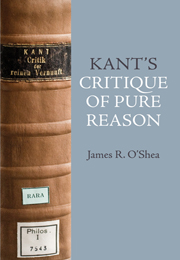Book contents
- Frontmatter
- Contents
- Preface
- INTRODUCTION
- 1 METAPHYSICS AND THE “FIERY TEST OF CRITIQUE”
- 2 WAKING FROM DOGMATIC SLUMBERS: HUME AND THE ANTINOMIES
- 3 SPACE AND TIME AS FORMS OF HUMAN SENSIBILITY
- 4 THE CATEGORIES OF UNDERSTANDING AND THE THINKING SELF
- 5 ONE LAWFUL NATURE
- 6 CONCLUSION: PURE REASON'S ROLE IN KANT'S METAPHYSICS OF NATURE
- Bibliography
- Index
6 - CONCLUSION: PURE REASON'S ROLE IN KANT'S METAPHYSICS OF NATURE
- Frontmatter
- Contents
- Preface
- INTRODUCTION
- 1 METAPHYSICS AND THE “FIERY TEST OF CRITIQUE”
- 2 WAKING FROM DOGMATIC SLUMBERS: HUME AND THE ANTINOMIES
- 3 SPACE AND TIME AS FORMS OF HUMAN SENSIBILITY
- 4 THE CATEGORIES OF UNDERSTANDING AND THE THINKING SELF
- 5 ONE LAWFUL NATURE
- 6 CONCLUSION: PURE REASON'S ROLE IN KANT'S METAPHYSICS OF NATURE
- Bibliography
- Index
Summary
Now that, the concept of which, contains within itself the ‘Because’ to every ‘Why?’ – that which is in no part or respect defective, that which is in all ways sufficient as a condition – seems to be the being suited to absolute necessity just because by itself possessing all the conditions for everything possible, it itself needs no condition, and is indeed not even susceptible of one.
(A585/B613)I will establish that reason accomplishes just as little on the one path (the empirical) as on the other (the transcendental), and that it spreads its wings in vain when seeking to rise above the world of sense through the mere might of speculation.
(A591/B619)One might have believed that this is merely a device of reason for achieving economy … Yet such a selfish aim can easily be distinguished from the idea, in accordance with which everyone presupposes that this [systematic] unity of reason conforms to nature itself; and here reason does not beg but commands, though without being able to determine the bounds of this unity.
(A653/B681)CLIPPING THE WINGS OF PURE SPECULATIVE REASON
Kant's overriding emphasis in the First Critique is on the need for a critique of pure reason: that is, for a strict intellectual disciplining (see “The Discipline of Pure Reason”, 738/B766ff.) of the overreaching pretensions of the lofty and inevitable ideas and ideals of our totalizing rational faculty.
- Type
- Chapter
- Information
- Kant's Critique of Pure ReasonAn Introduction and Interpretation, pp. 205 - 224Publisher: Acumen PublishingPrint publication year: 2011



